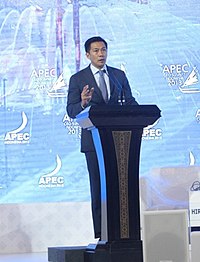
Photo from wikipedia
ABSTRACT Mentors enter informal mentoring relationships with various motives, but, to date, it is unclear how these motives shape mentor behaviours and mentoring outcomes. We propose a conceptual model to… Click to show full abstract
ABSTRACT Mentors enter informal mentoring relationships with various motives, but, to date, it is unclear how these motives shape mentor behaviours and mentoring outcomes. We propose a conceptual model to depict the relationships between mentor motives in informal mentoring and the individual, relational, and organizational outcomes of mentoring, with mentor behaviours as a mediating mechanism. We suggest that self-focused motives lead to self-focused behaviours, indicated by higher sensitivity to instrumental rewards, selectivity in relationship initiation, and calculatedness in relationship investment, which lead to mentoring outcomes primarily benefiting the mentor. Other-focused motives, in contrast, lead to other-focused behaviours, characterized by lower sensitivity to instrumental rewards, higher inclusivity in relationship initiation, and lower calculatedness in relationship investment, which result in a broader range of outcomes beneficial to both individuals and the organization. We further explore the impact of societal culture on mentor motives and behaviours. Our research suggests that human resource development professionals should be mindful of the mentor motive – behaviour linkages to optimize mentors’ engagement in informal mentoring relationships.
Journal Title: Human Resource Development International
Year Published: 2020
Link to full text (if available)
Share on Social Media: Sign Up to like & get
recommendations!